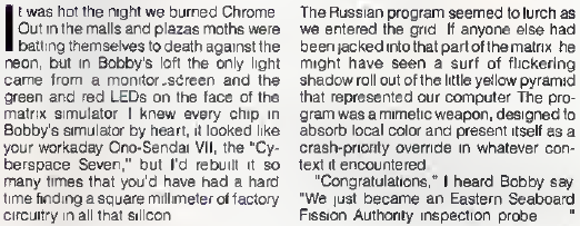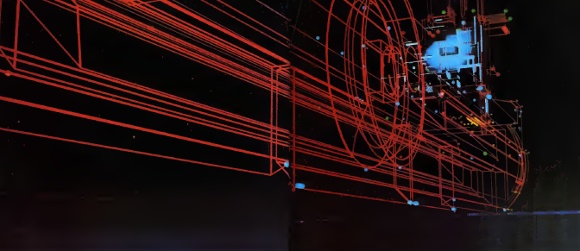omni collection online

This is a detail of page 72 of the July 1982 issue of the magazine ↑Omni. Depicted is the beginning of ↑William Gibson‘s short story ‘↑Burning Chrome.’ It is a bit of linguistic history, because here the word ‘cyberspace’ saw print for the very first time.
Fittingly enough in the same issue, right after the first part of Gibson’s short story, there is an article (Manna 1982) on ‘↑Tron‘ (Lisberger 1982) featuring double-paged stills, illustrating the subheading ‘A science-fiction film leaps inside a bizarre computer world’:

This picture spreads over pages 82 and 83 of Omni July 1982, showing off computer-generated imagery from ‘Tron.’ The caption reads: ‘Sark’s carrier is blasted back into its wire-frame skeleton’. It almost seems like the screen captures from ‘Tron’ serve as illustrations for ‘Burning Chrome.’
I am able to show you all this, because ↑The [Glorious] Internet Archive now carries a freely downloadable ↓complete collection of Omni magazine:
OMNI was a science and science fiction magazine published in the US and the UK. It contained articles on science fact and short works of science fiction. The first issue was published in October 1978, the last in Winter 1995, with an internet version lasting until 1998. […]
In its early run, OMNI published a number of stories that have become genre classics, such as Orson Scott Card’s “Unaccompanied Sonata”, William Gibson’s “Burning Chrome” and “Johnny Mnemonic”, Harlan Ellison’s novella “Mefisto in Onyx”, and George R. R. Martin’s “Sandkings”. The magazine also published original sf/f by William S. Burroughs, Joyce Carol Oates, Jonathan Carroll, T. Coraghessan Boyle, and other mainstream writers. The magazine excerpted Stephen King’s novel Firestarter, and featured a short story, “The End of the Whole Mess”. OMNI also brought the works of numerous painters to the attention of a large audience, such as H. R. Giger, De Es Schwertberger and Rallé.
To my mind Omni (1978-1995), together with ↑Heavy Metal (1977-), was one of the most important carriers and amplifiers of the ‘cyberpunk discourse’ (↑Wired saw the light of day not before January 1993).

